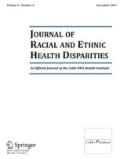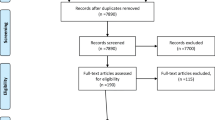Abstract
Healthcare discrimination experience is expected to be a consequential variable that explains racial/ethnic inequities in patient activation and health; however, existing scales assessing healthcare discrimination experience are limited by insufficient psychometric development and overly narrow construct definitions. A new Healthcare Discrimination Experience Scale was developed, validated, compared to an existing scale, and used to estimate effects in explaining racial/ethnic health inequities. Across two studies, 975 patients with hypertension or diabetes (43% Black, 10% other Persons of Color, 47% White, 53% having household incomes < 40 thousand dollars) were recruited through marketing research panels to complete online questionnaires. Compared to an existing measure, the new scale better detected differences between People of Color and White people. It produced good results in confirmatory factor analysis and item response theory analysis, and it mediated the effects of racial/ethnic identity on eight variables regarding patient-practitioner relationships, treatment adherence, general health, blood pressure, and life stress. The new scale is valid for assessing a broadly defined healthcare discrimination experience construct in diverse patients with chronic medical conditions, and it is more sensitive to group differences than the best existing alternative scale. Compared to research using unvalidated scales, the results of this study demonstrate that healthcare discrimination experience plays a larger role in explaining racial/ethnic inequities in patient activation and health.

Similar content being viewed by others
Data Availability
Data and materials available via request by email to the corresponding author.
References
Cooper LA, Marsteller JA, Carson KA, Dietz KB, Boonyasai RT, Alvarez C, et al. The RICH LIFE project: a cluster randomized pragmatic trial comparing the effectiveness of health system only vs. health system Plus a collaborative/stepped care intervention to reduce hypertension disparities. Am Heart J. 2020;226:94–113.
Williams DR, Mohammed SA. Discrimination and racial disparities in health: evidence and needed research. J Behav Med. 2009;32:20–47.
Kressin NR, Raymond KL, Manze M. Perceptions of race/ethnicity-based discrimination: a review of measures and evaluation of their usefulness for the health care setting. J Health Care Poor Underserved. 2008;19:697–730.
Cid J, Martí J. Imprisonment, social support, and desistance: a theoretical approach to pathways of desistance and persistence for imprisoned men. Int J Offender Ther Comp Criminol. 2017;61:1433–54.
Crawley LM, Ahn DK, Winkleby MA. Perceived medical discrimination and cancer screening behaviors of racial and ethnic minority adults. Cancer Epidemiol Prev Biomark. 2008;17:1937–44.
Sanford K, Rivers AS, Braun TL, Schultz KP, Buchanan EP. Medical consultation experience questionnaire: assessing perceived alliance and experienced confusion during medical consultations. Psychol Assess. 2018;30:1499–511.
Rivers AS, Sanford K. Both trusting and understanding medical advice: assessing patient alliance and confusion after medical consultations. Patient Educ Couns. 2019;.
Forsyth J, Schoenthaler A, Chaplin WF, Ogedegbe G, Ravenell J. Perceived discrimination and medication adherence in black hypertensive patients: the role of stress and depression. Psychosom Med. 2014;76:229–36.
Greer TM, Brondolo E, Brown P. Systemic racism moderates effects of provider racial biases on adherence to hypertension treatment for African Americans. Health Psychol. 2014;33:35–42.
Sanford K, Rivers AS. Treatment adherence perception questionnaire: assessing patient perceptions regarding their adherence to medical treatment plans. Psychol Assess. 2020;32:227–38.
Dolezsar CM, McGrath JJ, Herzig AJM, Miller SB. Perceived racial discrimination and hypertension: a comprehensive systematic review. Health Psychol. 2014;33:20–34.
Shavers VL, Fagan P, Jones D, Klein WMP, Boyington J, Moten C, et al. The state of research on racial/ethnic discrimination in the receipt of health care. Am J Public Health Am Public Health Assoc. 2012;102:953–66.
Williams DR, Yu Y, Jackson JS, Anderson NB. Racial differences in physical and mental health: socio-economic status, stress and discrimination. J Health Psychol. 1997;2:335–51.
Bird ST, Bogart LM. Perceived race-based and socioeconomic status(SES)-based discrimination in interactions with health care providers. Ethn Dis. 2001;11:554–63.
Peek ME, Nunez-Smith M, Drum M, Lewis T. Adapting the everyday discrimination scale to medical settings: reliability and validity testing in a sample of African American patients. Ethn Dis. 2011;21:502–9.
Jones KP, Arena DF, Nittrouer CL, Alonso NM, Lindsey AP. Subtle discrimination in the workplace: a vicious cycle. Ind Organ Psychol. 2017;10:51–76.
Pinel EC. Stigma consciousness: the psychological legacy of social stereotypes. J Pers Soc Psychol. 1999;76:114–28.
LaVeist TA, Nickerson KJ, Bowie JV. Attitudes about racism, medical mistrust, and satisfaction with care among African American and white cardiac patients. Med Care Res Rev. 2000;57:146–61.
Call KT, McAlpine DD, Garcia CM, Shippee N, Beebe T, Adeniyi TC, et al. Barriers to care in an ethnically diverse publicly insured population: is health care reform enough? Med Care. 2014;52:720–7.
Thompson HS, Valdimarsdottir HB, Winkel G, Jandorf L, Redd W. The Group-Based Medical Mistrust Scale: psychometric properties and association with breast cancer screening. Prev Med. 2004;38:209–18.
Sladek MR, Umaña-Taylor AJ, McDermott ER, Rivas-Drake D, Martinez-Fuentes S. Testing invariance of ethnic-racial discrimination and identity measures for adolescents across ethnic-racial groups and contexts. Psychol Assess Am Psychol Assoc. 2020;32:509–26.
Kim G, Sellbom M, Ford K-L. Race/ethnicity and measurement equivalence of the Everyday Discrimination Scale. Psychol Assess Am Psychol Assoc. 2014;26:892–900.
Arellano-Morales L, Roesch SC, Gallo LC, Emory KT, Molina KM, Gonzalez P, et al. Prevalence and correlates of perceived ethnic discrimination in the Hispanic Community Health Study/Study of Latinos Sociocultural Ancillary Study. J Lat Psychol Educ Publish Found. 2015;3:160–76.
Oh S, Litam SDA. COVID-19 racial discrimination on mental health and life satisfaction among Asian Americans: examining a moderated mediation model. Asian Am J Psychol [Internet]. Educational Publishing Foundation; 2022; Available from: http://ezproxy.baylor.edu/login?url=https://search.ebscohost.com/login.aspx?direct=true&db=psyh&AN=2022-55390-001&site=ehost-live&scope=site
Norton MI, Sommers SR. Whites see racism as a zero-sum game that they are now losing. Perspect Psychol Sci. 2011;6:215–8.
Barnes DM, Bates LM. Do racial patterns in psychological distress shed light on the Black-White depression paradox? A systematic review. Soc Psychiatry Psychiatr Epidemiol. 2017;52:913–28.
Carnethon MR, Pu J, Howard G, Albert MA, Anderson CAM, Bertoni AG, et al. Cardiovascular health in african americans: a scientific statement from the American Heart Association. Circulation. 2017;136:e393-423.
Holmes HM, Luo R, Hanlon JT, Elting LS, Suarez-Almazor M, Goodwin JS. Ethnic disparities in adherence to antihypertensive medications of medicare part D beneficiaries. J Am Geriatr Soc. 2012;60:1298–303.
Palmer NRA, Kent EE, Forsythe LP, Arora NK, Rowland JH, Aziz NM, et al. Racial and ethnic disparities in patient-provider communication, quality-of-care ratings, and patient activation among long-term cancer survivors. J Clin Oncol. 2014;32:4087–94.
Kim JHJ, Lu Q, Stanton AL. Overcoming constraints of the model minority stereotype to advance Asian American health. Am Psychol Am Psychol Assoc. 2021;76:611–26.
Aggarwal R, Chiu N, Wadhera RK, Moran AE, Raber I, Shen C, et al. Racial/ethnic disparities in hypertension prevalence, awareness, treatment, and control in the United States, 2013 to 2018 Hypertens Dallas Tex 1979. United States: Lippincott, Williams & Wilkins; 2021;78:1719–26.
Bleser WK, Miranda PY, Jean-Jacques M. Racial/ethnic disparities in influenza vaccination of chronically Ill US adults: the mediating role of perceived discrimination in health care. Med Care. 2016;54:570–7.
Lee C, Ayers SL, Kronenfeld JJ. The association between perceived provider discrimination, health care utilization, and health status in racial and ethnic minorities. Ethn Dis. 2009;19:330–7.
Sorkin DH, Ngo-Metzger Q, De Alba I. Racial/ethnic discrimination in health care: impact on perceived quality of care. J Gen Intern Med. 2010;25:390–6.
Chandler J, Rosenzweig C, Moss AJ, Robinson J, Litman L. Online panels in social science research: expanding sampling methods beyond Mechanical Turk. Behav Res Methods Springer. 2019;51:2022–38.
Ware JE, Snow KK, Kolinsk M, Gandeck B. SF-36 Health survey manual and interpretation guide. Boston: The Health Institute, New England Medical Center; 1997.
Cohen S, Kamarck T, Mermelstein R. A global measure of perceived stress. J Health Soc Behav. 1983;24:385–96.
Rosseel Y. lavaan: An R package for structural equation modeling. J Stat Softw. 2012;48:1–36.
Hu L, Bentler PM. Cutoff criteria for fit indexes in covariance structure analysis: conventional criteria versus new alternatives. Struct Equ Model. 1999;6:1–55.
Comrey AL, Lee HB. A first course in factor analysis. 2nd ed. Hillsdale, N.J: Psychology Press; 1992.
Samejima F. Estimation of latent ability using a response pattern of graded scores. [Internet]. Richmond, VA: Byrd Press; 1969. Available from: https://doi.org/10.1007/BF03372160
Rizopoulos D. ltm: An R package for latent variable modeling and item response theory analyses. J Stat Softw. 2006;17:1–25.
American Medical Association and Association of American Medical Colleges. Advancing health equity: guide on language, narrative and concepts. [Internet]. American Medical Association; 2021 [cited 2022 May 19]. Available from: ama-assn.org/equity-guide
Funding
This research was supported by a grant from the Baylor University Research Committee.
Author information
Authors and Affiliations
Contributions
KS was responsible for the study conception and design, data collection, data analysis, and writing the manuscript. AP contributed to conducting literature reviews and writing the manuscript.
Corresponding author
Ethics declarations
Ethics Approval
This study was declared exempt by the Baylor University Institutional Review Board due to the online survey methodology.
Consent to Participate
All participants provided informed consent.
Consent for Publication
All participants consented for their deidentified responses to be included in research publications.
Conflict of Interest
The authors declare no competing interests.
Additional information
Publisher's Note
Springer Nature remains neutral with regard to jurisdictional claims in published maps and institutional affiliations.
Rights and permissions
About this article
Cite this article
Sanford, K., Pizzuto, A.E. The Healthcare Discrimination Experience Scale: Assessing a Variable Crucial for Explaining Racial/Ethnic Inequities in Patient Activation and Health. J. Racial and Ethnic Health Disparities 10, 1642–1652 (2023). https://doi.org/10.1007/s40615-022-01350-2
Received:
Revised:
Accepted:
Published:
Issue Date:
DOI: https://doi.org/10.1007/s40615-022-01350-2




